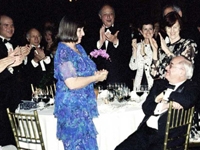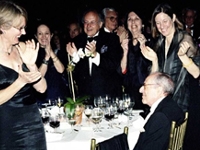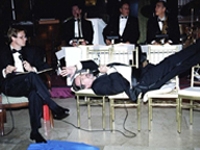
Dr. Robert Michels (seated) receives a standing ovation from colleagues and friends.
The Payne Whitney Faculty Council, the Payne Whitney Alumni Association and the Department of Psychiatry hosted a gala dinner and dance in June to honor two distinguished members of their faculty, Dr. Arnold Cooper and Dr. Robert Michels.
Dr. Michels, a noted psychoanalyst, psychiatrist, scholar and teacher, served as chairman of the Department of Psychiatry from 1974 to 1991 and as dean of the Medical College from 1991 to 1996. His clinical and research interests in psychiatry have focused on psychoanalysis, personality disorders and medical ethics. Dr. Michels is currently the Walsh McDermott University Professor of Medicine and Psychiatry.

Dr. Arnold Cooper (seated) receives a standing ovation from colleagues and friends.
"With stunning intellectual capacities and humor, Robert Michels can provide a clear analysis of any problem—from the most difficult clinical situation to consideration of the multiple sciences that make up our field. As chairman, he built a great department, and then played a major role in the development of the Medical College as dean. It has been my great pleasure to have known him as a dear friend for 40 years," said psychiatry Chairman Dr. Jack Barchas.
Dr. Cooper joined the department in 1974 as professor of psychiatry and director of resident and medical student education in psychiatry. His research interests have included psychoanalytic concepts, personality disorders (especially narcissism and masochism), the role of psychoanalysis in society, psychoanalytic and psychotherapeutic technique, and the relationship of psychoanalysis to psychiatry and applied analysis. Dr. Cooper is the Stephen P. Tobin and Dr. Arnold M. Cooper Emeritus Professor in Consultation Liaison Psychiatry. The Tobin-Cooper professorship was established in 1992 by the father of an adolescent boy who died of cancer many years earlier and who was under the care of Dr. Cooper.
"Arnold Cooper is an inspiring teacher, clinician, scholar and mentor. His intellect, warmth and heart are demonstrated in venues ranging from being the consummate clinical consultant to directing a residency program and serving as deputy editor of the American Journal of Psychiatry. There are few more beloved figures in our field," said Dr. Barchas.
The dinner-dance, held on June 20, was part of a two-day program presented by the Department of Psychiatry, the Payne Whitney Faculty Council, and the Payne Whitney Alumni Association, whose members are former psychiatric residents and fellows. The program continued on June 21 with "A Journey Through the New Payne Whitney Clinic," which featured six presentations on "What's New in Research and Education," a luncheon, and a tour of the new Payne Whitney Clinic in the Greenberg Pavilion and the Psychiatric Emergency Department.

A highlight of the program was a spoof of a psychoanalytic "couch" session performed by Dr. John Barnhill (left, as the "psychoanalyst") and Dr. Kevin Kelly (right, as the "patient").
"This event brought together more than 240 residents, fellows and faculty, who represented several generations in the history of the Payne Whitney Clinic," said dinner organizer Dr. David Shapiro, clinical associate professor of psychiatry and president of the Payne Whitney Faculty Council.
The Payne Whitney Clinic is the traditional name for the Department of Psychiatry at the NewYork Weill Cornell Medical Center. It is named for the philanthropist whose vision led to the establishment of The New York Hospital-Cornell Medical Center, which opened at 68th Street and York Avenue in 1932. The Payne Whitney Clinic occupied its own building at the Medical Center until 1994, when the building was razed to permit construction of the Greenberg Pavilion, the Hospital's new inpatient building, where the psychiatric inpatient service is now located on the 11th floor (11 North). The Payne Whitney Clinic's administrative and faculty offices and some ambulatory services are located on the 12th floor of the main building, and other ambulatory services are provided at 425 E. 61st St.

